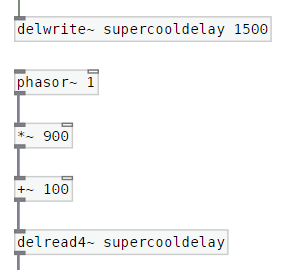-
 Delta Sign
posted in this forum • read more
Delta Sign
posted in this forum • read moreClick on the little cog wheel (is that the right word?) on the bottom left and choose "Flag this post for moderation".
-
 Delta Sign
posted in Off topic • read more
Delta Sign
posted in Off topic • read moreYeah, I just have a simple "abstractions" folder right next to my "patches" folder where I put my reusable abstractions. Each patch gets it's own folder, so I can save abstractions that are unique to that patch in the same folder as the main patch without making a mess.
My samples are in their own huge folder, neatly organized. However, I recorded most of those during the last 15 years or something, while I'm still quite new to PD, so those were organized before I got into PD already.
How do you guys name your abstractions? I always prefix mine with "ds_". I have a "ds_xth" abstraction that only passes each xth bang it recieves, for example. I'm new to this, so it would be interesting to hear if that's the "right" way to do it.
-
 Delta Sign
posted in technical issues • read more
Delta Sign
posted in technical issues • read more@Coalman Not a solution, but have you tried to install Purr Data instead? Just to see if that works? Maybe it would help find the problem. It comes with most of the popular externals.
I'm a noob at this, but that's the first thing I can think of.
-
 Delta Sign
posted in pixel# • read more
Delta Sign
posted in pixel# • read moreYeah, what @Coalman said.
OBS is kind of the standard solution for screen recording on Windows. Most streamers, youtubers and such use it as well. It's quite capable and free, which is nice.
I once tried to record PD with it and got a solid 7 FPS and horrible audio crackling, but that's because my crap computer is on the verge of dying haha
Edit: Also, I'm glad you got it working using your creative solution, @orsk!
I might have to try something like that myself. -
 Delta Sign
posted in patch~ • read more
Delta Sign
posted in patch~ • read moreThis is such a cool idea! I'll definitely have to check this out! Thanks for sharing!
-
 Delta Sign
posted in this forum • read more
Delta Sign
posted in this forum • read moreHi!
There is an option on the settings page that lets you choose between different skins, which are supposed to change the look of the site, I assume. However, it doesn't seem to work. It's not really important, but I thought I should bring it up anyway. It would be cool to have some kind of dark "night" skin after all.
I'm using Chrome on Windows 8.1.
By the way, this is probably the fastest site on the internet. I'm on super slow internet right now and nothing really loads, not even super basic stuff like Gmail in html mode, but this site works just like always.
-
-
 Delta Sign
posted in technical issues • read more
Delta Sign
posted in technical issues • read moreYeah, like the others said, the [delwrite~] argument only sets the maximun delay time. You can change the actual delay time with the inlet on the [delread~] object.

The [phasor~] only changes the delay time from 100 to 1000 in this example, so it would be enough to set the [delwrite~] argument to 1000, because that's the highest the delay time is ever going to get, but I set it a little bit higher because it doesn't really matter on modern computers anyway and it's nice to have a bit of wiggle room.
-
-
 Delta Sign
posted in technical issues • read more
Delta Sign
posted in technical issues • read more@Johnny-Mauser Ohh nice! That definitely looks interesing! I'm going to check it ous asap! Thanks!
@whale-av Yeah, I know. I'm basically just using random objects as number stream generators, so it doesn't really matter. I guess one could use the system time or something as a seed to get different numbers each time.
-
 Delta Sign
posted in technical issues • read more
Delta Sign
posted in technical issues • read more@Jona Ohh yeah, bytebeat stuff is very interesting, it's kind of insane how far people took it since it first came up.
Regarding my patch sounding more musical than some more sophisticated approaches, that's basically what my problem is. I find it difficult to come up with creative sequencing solutions, that are not only fancy, but actually sound good and musical. I often find that the more complex something gets, the harder it becomes for the listener to actually follow what's going on, so I might as well just use random sources, if that makes any sense.
I like what Sean Booth himself once said in an Interview:
"It's like saying, 'I want this to go from this beat to that beat over this amount of time, with this curve, which is shaped according to this equation. Or you want all the sounds and the way the rhythm works to change, and you don't quite know how long the transform will take. You can then build a patch to do the transform, and you do it by ear with a fader. We may have one fader that determines how often a snare does a little roll or skip, and another thing that listens and says 'If that snare plays that roll three times, then I'll do this.' We don't use random operators because they're irritating to work with — every time you run the process it sounds different. How we play the system dictates how the system responds."
It sounds like they are working with manipulating actual sequences instead of letting the system generate the whole thing from scratch, which is definiely something I have to play with a bit more.
-
 Delta Sign
posted in technical issues • read more
Delta Sign
posted in technical issues • read moreHi! I hope this is the right forum to post this!
When I sequence stuff in PD, I rely on simple chance based systems way too often and I'd like to change that. So, what are your favorite ways to sequence things in PD? Maybe creative ways to sequence sequencers using other sequencers, maybe some fancy neural network, maybe something completely different?
I'd really like to hear about your ideas. I, and maybe also other people, would really appreciate your input on this.
Thanks in advance!
-
 Delta Sign
posted in patch~ • read more
Delta Sign
posted in patch~ • read moreYeah, the download is already in the post. I probably should have made that more visible. Sorry for that.
I'm glad you guys like the patch! It's really nothing special compared to the amazing things people are doing with PD, but it was fun to make!
-
 Delta Sign
posted in patch~ • read more
Delta Sign
posted in patch~ • read moreA silly little Vanilla Pure Data patch I made while browsing the internet. I just left it running in the background, came back to it to change a few things, left it running while browsing again...
It's nothing special and quite simple, but it was a fun thing to do.
The patch looks like this (Yes, it's a horrible mess), and this what it sounds like:
I'm quite new to PD, so I probably did a lot of things horribly "wrong", but the patch was a lot of fun to make in the background nonthless. I made the whole thing in Purr Data, but I didn't use any externals, so it runs perfectly fine in Vanilla PD.
